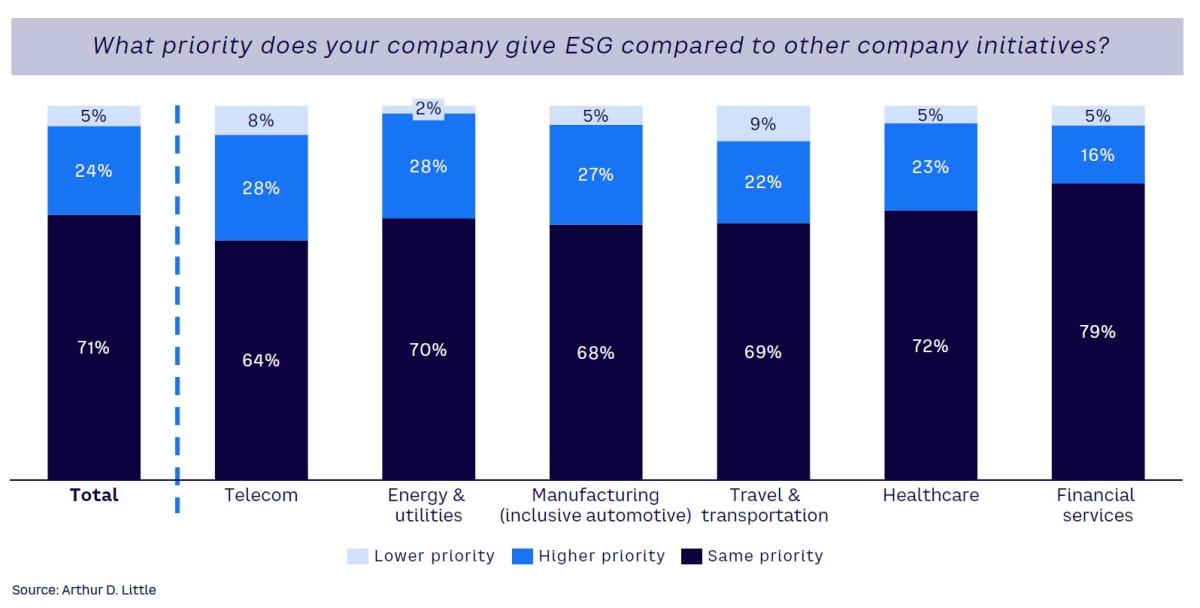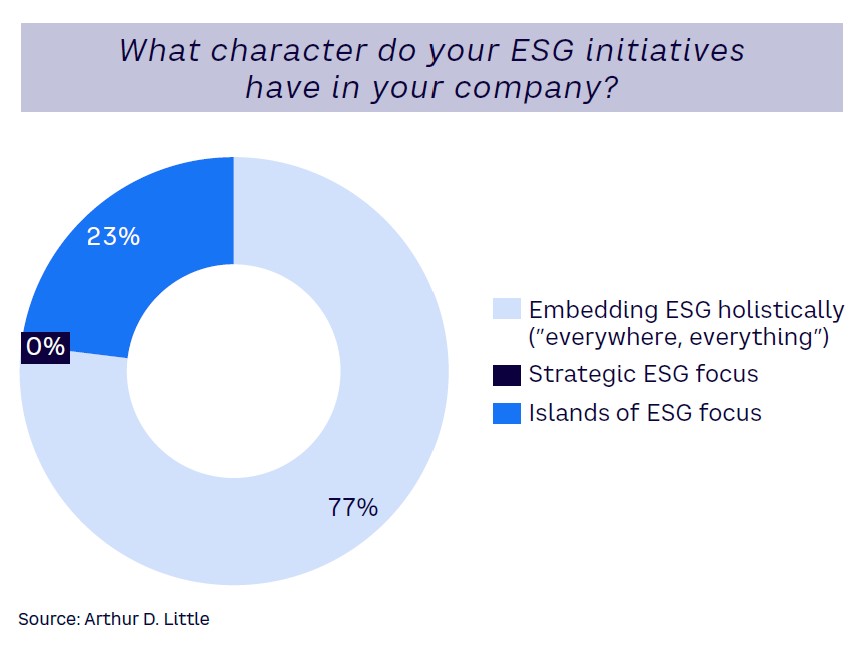As part of its ongoing series of flagship CEO Insights research studies, Arthur D. Little (ADL) recently published its 2024 edition: “Positive in an Uncertain World: Confident CEOs Reskill Companies for AI-Driven Growth.” In this Advisor, we explore a key trend revealed through research analysis: while a shift has occurred in ESG (environmental, social, and governance) priorities, approaches to it have matured, and most leaders still see its importance.
ESG Becomes One of Many Business Priorities
How CEOs approach and prioritize ESG initiatives is undergoing a notable shift as sustainability develops (see Figure 1). Whereas in our 2023 study, 41% gave it a higher priority than other activities, in 2024 this has diminished to just 24%.

Essentially, most CEOs consider ESG as part of “business as usual,” with their approaches maturing over the course of the last 12 months. Clearly, CEOs still see ESG as important, but 71% now rank it on a par with other priorities, up from 58% in 2023.
“As the emphasis on renewable energy sources and ecologically friendly operations grows, we are making long-term investments in and adoption of sustainable practices.” — CEO, energy & utilities
This shift is particularly noticeable in manufacturing, where 35% fewer CEOs see it as a higher priority than in 2023, and travel and transportation, where it has declined by 25%. In fact, 9% of travel and transportation CEOs report that ESG is now less important than other priorities, pointing to either increased maturity (which means it has become an integral part of business operations) or that other more pressing factors have overtaken it in terms of focus. By organizational size, while the overall trend is toward reduced prioritization of ESG, larger organizations are still more likely to focus on it above other activities, with a third (33%) seeing it as more important than other initiatives, compared to 22% of those with revenues between $1-$10 billion.
A Divided Picture on ESG Approaches
Compared to 2023, the gap between perspectives of CEOs on ESG seems to have widened. Demonstrating its importance to the overall business, Figure 2 shows that 77% of executives have a clear holistic approach that embeds ESG across their organization (up from 24%). Essentially, they are looking at ESG in every activity and department, led from the top, working together to monitor progress and meet sustainability goals.

“Our commitment to corporate social responsibility [CSR] is not just a checkbox; it’s our moral compass.” — CEO, travel & transportation
However, the remaining 23% characterize their approach as creating islands of ESG focus (up from 2% in 2023). Not taking a holistic view may mean that they are concentrating resources and time where it is required most, such as in decarbonizing specific activities or processes, taking a pragmatic approach based on their specific circumstances.
Seeing ESG as Differentiatior for Long-Term Success
Large organizations in many regions face regulatory requirements to become more sustainable and to demonstrate transparency and good governance. However, CEOs see the benefits of embracing ESG for multiple reasons, from attracting and retaining customers, staff, and investors to more altruistic desires to protect the planet and leave a positive legacy.
“Our attention is directed toward ESG aspects, which have the potential to draw in a larger pool of investors and foster closer ties with customers who value social responsibility.” — CEO, telco
“It is important to set a good example around CSR initiatives by making meaningful contributions to the communities where the business is located.” — CEO, financial services
CEOs are creating and spreading a sense of purpose and ethical standards across their business, helping to increase financial and reputational strengths. In many cases, focusing on ESG provides a way to cope with volatility, providing a “North Star” for the business to follow.
“The most important thing in a company is its purpose. We want to manufacture the best products while respecting the environment and all other manufacturers. Employees, especially younger ones, are important to us and the future of our company.” — CEO, manufacturing
“We adopt sustainability practices to appeal to environmentally conscious consumers and manage continuous market volatility.” — CEO, healthcare






